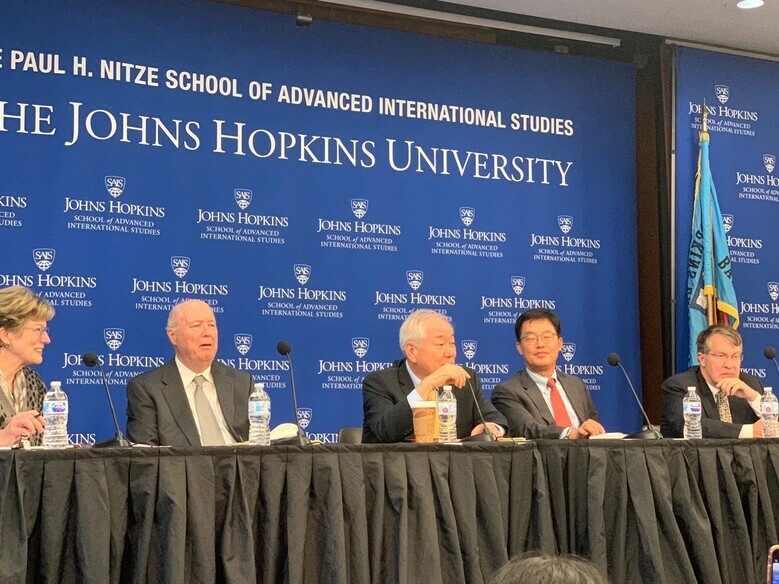hankyoreh
Links to other country sites 다른 나라 사이트 링크
US must engage in “preventive diplomacy” before N. Korea tests another nuke, says expert

Moon Chung-in, chairman of the Sejong Institute, argued at a seminar held in Washington on Oct. 6 that the US should take bold steps to resume dialogue with North Korea before it moves forward with a seventh nuclear test.
The seminar, which addressed the future of the South Korea-US alliance amid the changing geopolitical landscape, was jointly organized by the Johns Hopkins School of Advanced International Studies (SAIS) and the East Asia Foundation.
Regarding the recent string of ballistic missile launches by North Korea, Moon predicted, “An ICBM launch and a nuclear test will come next, and if North Korea goes down that path, it will be extremely difficult to resume meaningful dialogue.”
He also speculated that President Yoon Suk-yeol of South Korea and US President Joe Biden will not act as prior administrations have, saying, “Looking at past examples, some may expect new talks and negotiations to occur after a seventh nuclear test, but that is not the case this time.”
Moon said that the US needs to take a “bolder approach” and engage in “preventive diplomacy” before North Korea conducts a seventh nuclear test. He suggested that the US strengthen its approach to prevent a vicious cycle, pointing to North Korean leader Kim Jong-un’s speech to the Supreme People’s Assembly last month, which seems to leave open the possibility for dialogue.
“South Korea could be the first victim of a new Cold War,” said Moon on the growing competition between the US and China, adding that the South Korean government needs to conduct balanced and practical diplomacy.
Park Cheol-hee, a professor at the Seoul National University Graduate School of International Studies, said that in the past, the South Korean government would “usually reach out and offer to engage in dialogue” when North Korea instigated a crisis. However, he added that “North Korea is dealing with a new South Korea now.”
Park said actions such as ballistic missile launches will strengthen South Korea-US-Japan cooperation and bring about “consequences completely opposite” from what North Korea intends.
“We must open a dialogue channel with North Korea and come up with ways to defuse the situation,” he urged, adding that North Korea is likely to continue to escalate tensions.
Charles Doran, a professor at SAIS, shared his understanding that the series of ballistic missile launches are intended by North Korea and China to intimidate Japan and isolate South Korea. “China and North Korea do not want South Korea to join the Quad,” he stated, while arguing for South Korea’s entry into the strategic forum.
By Lee Bon-young, Washington correspondent
Please direct questions or comments to [english@hani.co.kr]

Editorial・opinion
![[Guest essay] Preventing Korean Peninsula from becoming front line of new cold war [Guest essay] Preventing Korean Peninsula from becoming front line of new cold war](https://flexible.img.hani.co.kr/flexible/normal/500/300/imgdb/original/2024/0507/7217150679227807.jpg) [Guest essay] Preventing Korean Peninsula from becoming front line of new cold war
[Guest essay] Preventing Korean Peninsula from becoming front line of new cold war![[Column] The state is back — but is it in business? [Column] The state is back — but is it in business?](https://flexible.img.hani.co.kr/flexible/normal/500/300/imgdb/original/2024/0506/8217149564092725.jpg) [Column] The state is back — but is it in business?
[Column] The state is back — but is it in business?- [Column] Life on our Trisolaris
- [Editorial] Penalties for airing allegations against Korea’s first lady endanger free press
- [Editorial] Yoon must halt procurement of SM-3 interceptor missiles
- [Guest essay] Maybe Korea’s rapid population decline is an opportunity, not a crisis
- [Column] Can Yoon steer diplomacy with Russia, China back on track?
- [Column] Season 2 of special prosecutor probe may be coming to Korea soon
- [Column] Park Geun-hye déjà vu in Yoon Suk-yeol
- [Editorial] New weight of N. Korea’s nuclear threats makes dialogue all the more urgent
Most viewed articles
- 1[Guest essay] Preventing Korean Peninsula from becoming front line of new cold war
- 260% of young Koreans see no need to have kids after marriage
- 3Yoon’s broken-compass diplomacy is steering Korea into serving US, Japanese interests
- 4After 2 years in office, Yoon’s promises of fairness, common sense ring hollow
- 5[Column] Why Korea’s hard right is fated to lose
- 6S. Korean first lady likely to face questioning by prosecutors over Dior handbag scandal
- 7Is Japan about to snatch control of Line messenger from Korea’s Naver?
- 8[Column] The state is back — but is it in business?
- 946% of cases of violence against women in Korea perpetrated by intimate partner, study finds
- 10[Column] The first year of war in Ukraine